Indianz.Com > News > National Congress of American Indians returns to tradition with announcement of new executive
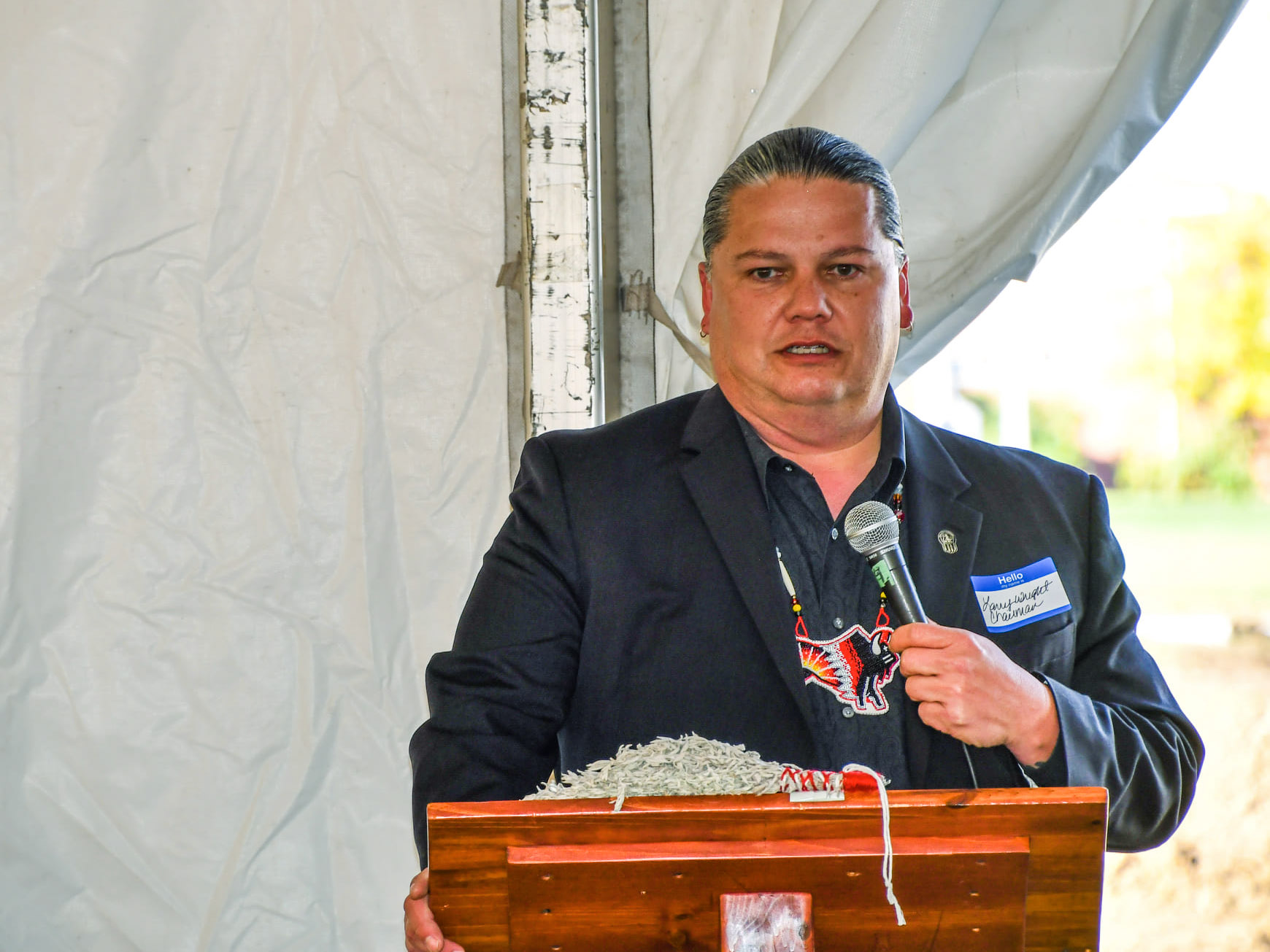
National Congress of American Indians returns to tradition with announcement of new executive
Tuesday, September 13, 2022
Indianz.Com
WASHINGTON, D.C. — The largest inter-tribal advocacy organization in the United States
is forging ahead with a new executive as tribes continue to confront challenges to their sovereignty.
Larry Wright Jr., a former chairman of the Ponca Tribe, is now serving as the Executive Director of the National Congress of American Indians. His position was announced by the organization on Monday.
“NCAI is excited to welcome and congratulate Larry Wright, Jr. in his new role within the organization,” President Fawn Sharp said in a news release. “He is a familiar face to many after having served as Chairman of the Ponca Tribe of Nebraska for more than a decade and serving as a board member of several tribal organizations across the country—including NCAI.”
“His experience advocating on behalf of tribal nations coupled with his unique understanding of the critical role NCAI plays to protect and advance tribal sovereignty make him the ideal candidate to lead this organization forward,” said Sharp, who also serves as vice president of the Quinault Nation.
Wright has already been working at NCAI as its Director of Leadership Engagement. In that role, he has been working with the organization’s member tribes to address issues facing them on the national, state and local levels. According to the news release, Wright is now responsible for managing the day-to-day operations of the organization, whose headquarters in Washington, D.C., is known as the Embassy of Tribal Nations. He will report directly to the NCAI Executive Committee, which consists of tribal leaders from every region of the U.S. “Larry’s appointment is an example of the NCAI Executive Committee’s thoughtful commitment to building a strong organization from within, and we are confident that NCAI will benefit from Larry’s demonstrated history of leadership and ability to address the needs of tribal nations,” said Sharp. “We look forward to working together to build a stronger, more responsive organization that will continue to fiercely defend tribal sovereignty just as we have since our inception in 1944.” Similar management duties were previously handled by the Chief Executive Officer of NCAI. But with the announcement of Wright’s role, NCAI is returning to the use of “Executive Director” following the exit of the organization’s prior CEO. The “Executive Director” title had been used for almost the entirety of NCAI’s 70-plus year history. On August 12, NCAI announced that it had “parted ways” with Dante Desiderio, who was on the job as CEO for barely a year. He had been placed on administrative leave without pay two months prior — on the eve of the organization’s first in-person conference of the COVID-19 era — for undisclosed reasons.NCAI is pleased to announce the selection of Larry Wright, Jr. (Ponca Tribe of Nebraska) as Executive Director. The former tribal chairman and military veteran brings a diverse background to create a pathway to long-term success at NCAI & the NCAI Fund.
— National Congress of American Indians (@NCAI1944) September 12, 2022
🔗https://t.co/sUl8p6RqAg pic.twitter.com/ip1d6xbYBt
From the Archive: Sovereignty Run 2002
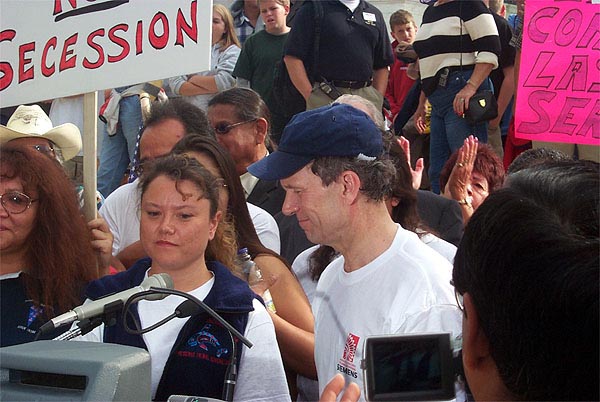
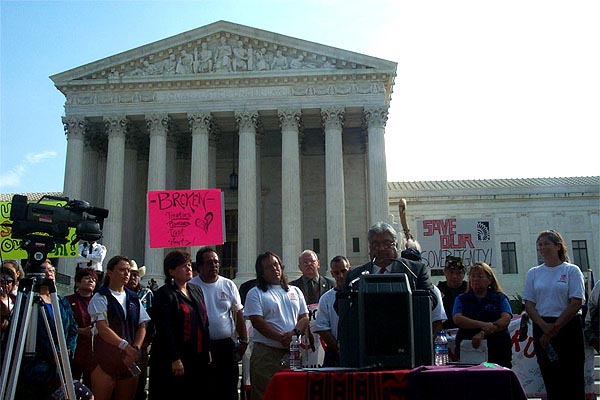
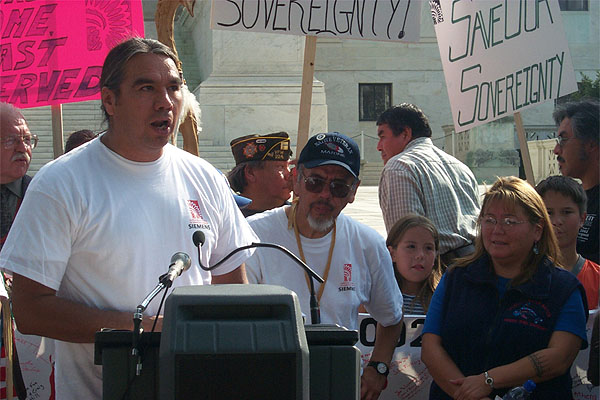
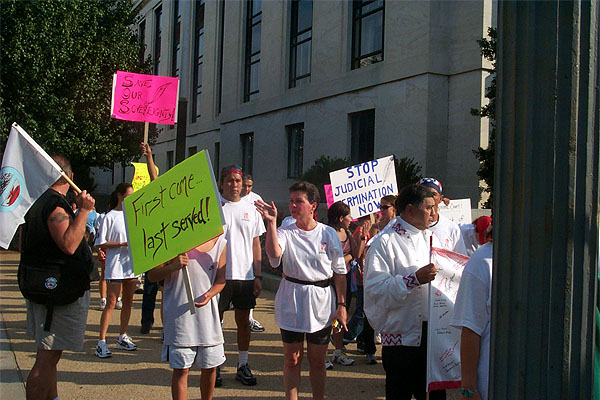
The Supreme Court will hear arguments in Brackeen on November 9 — not long after NCAI concludes its 79th annual convention. The event, which takes place October 30 through November 4 in Sacramento, California, will include a special focus on the threats facing tribes and their sovereignty. To help raise awareness of the dangers to tribal rights, NCAI President Fawn Sharp is announcing the 20th Anniversary Sovereignty Run, A press conference is taking place at the Embassy on Tribal Nations on Tuesday afternoon. According to a person with direct knowledge of the planning, the Sovereignty Run is due to kick off in Oklahoma in early October. Participants from tribal communities will cross several states as they make their way to California for the start of the NCAI convention. The Sovereignty Run is especially notable, as Sharp planned the very first one back in 2002, when she was working as an attorney for her tribe. The calling card for the 2,800-mile journey from Washington state to Washington, D.C., was coined by the future NCAI president and Natalie Charley, the co-organizer of the historic event. “Every mile counts,” Sharp told Indianz.Com 20 years ago.
Related Stories
Search
Filed Under
Tags
More Headlines
Chuck Hoskin: Cherokee Nation helps heal our communities
Native America Calling: Native skin cancer study prompts new concerns about risk
South Dakota Searchlight: Trump terminations hit Indian Arts and Crafts Board
Native America Calling: Regional improvement in suicide statistics is hopeful sign
List of Indian Country leases marked for termination by DOGE
‘Let’s get ’em all done’: Senate committee moves quickly on Indian Country legislation
AUDIO: Senate Committee on Indian Affairs Business Meeting to consider several bills
VIDEO: Senate Committee on Indian Affairs Business Meeting to consider several bills
Native America Calling: The ongoing push for MMIP action and awareness
‘Blindsided’: Indian Country takes another hit in government efficiency push
Native America Calling: A new wave of resistance against Trans Native relatives
Urban Indian health leaders attend President Trump’s first address to Congress
‘Mr. Secretary, Why are you silent?’: Interior Department cuts impact Indian Country
Cronkite News: Two Spirit Powwow brings community together for celebration
Native America Calling: Native shows and Native content to watch
More Headlines
Native America Calling: Native skin cancer study prompts new concerns about risk
South Dakota Searchlight: Trump terminations hit Indian Arts and Crafts Board
Native America Calling: Regional improvement in suicide statistics is hopeful sign
List of Indian Country leases marked for termination by DOGE
‘Let’s get ’em all done’: Senate committee moves quickly on Indian Country legislation
AUDIO: Senate Committee on Indian Affairs Business Meeting to consider several bills
VIDEO: Senate Committee on Indian Affairs Business Meeting to consider several bills
Native America Calling: The ongoing push for MMIP action and awareness
‘Blindsided’: Indian Country takes another hit in government efficiency push
Native America Calling: A new wave of resistance against Trans Native relatives
Urban Indian health leaders attend President Trump’s first address to Congress
‘Mr. Secretary, Why are you silent?’: Interior Department cuts impact Indian Country
Cronkite News: Two Spirit Powwow brings community together for celebration
Native America Calling: Native shows and Native content to watch
More Headlines
